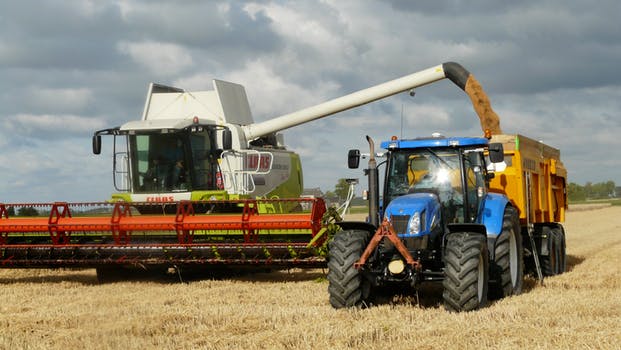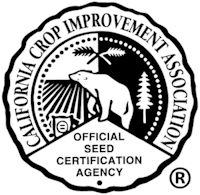Change in research fees
The CCIA collects research fees on pounds of seed certified for certain crops. The Board of Directors allocate the funds collected to research projects that benefit these crops. At the September Board of Directors meeting, the Board voted to adjust the research fees as listed below; these changes will take effect April 1, 2012.
Alfalfa ‐ no change; remains at $0.25/cwt
Beans ‐ increase from $0.15 to $0.20/cwt
Clover ‐ no change; remains at $0.05/cwt
Cotton ‐ no change; remains at $4.00/cwt
Small grains ‐ increase from $0.22 to $0.25/cwt
(barley, oats, triticale, wheat)
Application for renewals for perennial crops
Applications for perennial field crops must be renewed each February. After logging into their account, applicants will find a link
(near the link to begin a new application) to the applications which are eligible for renewal. This link will be available on February 1st.
For each renewal, one of the following actions MUST be chosen:
1. Renew application ‐ the production field will be used for seed production in the 2012 crop year.
2. No crop ‐ a seed crop will not be produced this crop year, but the field should remain in the certification program for future years.
3. Cancel ‐ field is cancelled and removed from the certification program.
The applicant MUST take action on all existing perennial applications BEFORE March 1st. If no action is taken by this date the application will be cancelled.
New field inspection summary
We have added a useful tool to the CCIA web site. When viewing the list of your applications, there is now a link titled "Field Inspection Summary" in the menu at the top of the screen. This summary page will provide all the vital information for each
application as well as the status of the application. The grid may be exported to MS Excel for sorting or other manipulation of the data as needed.
Position available at CCIA
The CCIA is looking for a motivated individual to provide support to the CCIA staff by assisting with field inspections throughout California, planting and reading germination tests in the seed lab, providing support in the preparation and planting of post‐control grow‐outs, and printing certification tags. Requirements: Bachelor’s degree in Agriculture (or closely related field) or 5 years’ experience in Agriculture industry (preferably the seed industry); valid California driver’s license; ability to work in field environment, walk long distances on uneven terrain, travel and stay away from home for several days at a time.
Clarification to alfalfa seed standards
At the annual AOSCA meeting in July 2011 a clarification was made to the alfalfa seed standards. The amount of "Total other crop seed" allowed is 2.0% maximum. Check the alfalfa crop standards at the CCIA web site for the complete table of seed standards.
Scholarships awarded
California State University, Chico
Sarah Jane Neuharth was chosen as the 2011 CCIA Scholarship recipient at Chico State. Sarah is originally from Yelm High School in Yelm, Washington. During her senior year of high school she was elected as the State FFA Treasurer and spent the next year traveling around the state and the nation as an ambassador for Washington agriculture and FFA. She is currently studying Crop Science, Horticulture and Land Resource Management at California State University, Chico in the College of Agriculture. She is actively involved in several student organizations, serving in a leadership position for some of them, including the Crop Science & Horticulture Club, Alpha Zeta, and Agriculture Ambassadors. Sarah has accepted a position after graduation with Pioneer Hi‐Bred as a production education consultant, utilizing her scientific academic background with a passion for interacting with others.
California State University, Fresno
Raul S. Dominguez received the 2011 CCIA Scholarship at Fresno State. Robert Stewart presented the award at the fall “Welcome Back BBQ” in September 2011. Raul is currently a Plant Health major after transferring from Reedley College. While attending Reedley College, Raul received multiple achievement awards from the Plant and Soil Science Department. Along with being a full time student, Raul is a father with 3 children and works for UPS. Raul's career goals include a Master's program in Plant Breeding.
Grower Opportunity Zones (GOZ)
The CCIA recently updated the Alfalfa Isolation Management Map to include Grower Opportunity Zones (GOZ) which have been established by the National Alfalfa and Forage Alliance (NAFA) criteria. These are geographic areas where 80% of the growers have agreed to either allow the production of genetically engineered (GE) alfalfa or alfalfa seed, or are designated as adventitious presence sensitive (AP‐Sensitive) areas where GE alfalfa may not be cultivated. GOZs have been added in California, Washington, Oregon, Idaho, Nevada, Utah, Montana, and Wyoming. In California, Imperial County is a non‐GE seed production area ‐ growers have formed an alliance not to allow cultivation of GE alfalfa but they have not formed an official GOZ. From the NAFA web page: "The Imperial Valley of California is a large and concentrated alfalfa seed production area. In light of the unique growing circumstances in Imperial County and the current international approval status of RRA, Monsanto has worked with the Imperial County Farm Bureau and established unique stewardship requirements for RRA in Imperial County, which are set forth in the Monsanto Technology Use Guide and Monsanto Technology Stewardship Agreement. All alfalfa seed production in Imperial County currently meets the isolation standards for ASSP, making this a very favorable production area for non‐dormant alfalfa seed destined for APS markets."
What is AOSCA?
The first organizations engaging in seed certification were in the central states and in Canada. A few of these organizations met together in 1919 and established what became known as the International Crop Improvement Association; later the name was changed to the Association of Seed Certifying Agencies (AOSCA). Through the efforts of participating agencies, it has been highly successful in creating uniform seed certification standards throughout this continent. More information is available at http://www.aosca.org.
Reminder - harvester inspection
 Harvesting of certified seed is subject to supervision of the local county Agricultural Commissioner, whose office MUST be notified prior to the harvest of certified seed (California Agricultural Code, Division 18, Chapter 2, California Seed Law, Article 7, Section 52421(b)). All harvesting equipment and any conveyances used to handle the certified seed must be cleaned and verified by the county Agricultural Commissioner prior to harvest or use. The cleaning of harvesting equipment is the joint responsibility of the applicant and/or grower.
Harvesting of certified seed is subject to supervision of the local county Agricultural Commissioner, whose office MUST be notified prior to the harvest of certified seed (California Agricultural Code, Division 18, Chapter 2, California Seed Law, Article 7, Section 52421(b)). All harvesting equipment and any conveyances used to handle the certified seed must be cleaned and verified by the county Agricultural Commissioner prior to harvest or use. The cleaning of harvesting equipment is the joint responsibility of the applicant and/or grower.
FOV 4 in cotton
The CCIA is working with the cotton industry to investigate the identification of Fusarium Race 4 (FOV 4) in the San Joaquin Valley. This pathogen has been found in this area for several years, but with the expanded cotton acreage it has been noted in more areas than ever before and in all six SJV cotton producing counties.
History of the CCIA - part 1
This is the first in a continuing series documenting the history of the CCIA. The first attempt at seed certification in California began in 1925. Members of the California Farm Bureau Federation felt a need for such a service and created what was known as the Pure Seed Association. This organization led by T. A. Kilkenny, who was president for most of its existence, had as its goal the certification of grain seed. It was only moderately successful, and by 1929 was apparently running into difficulties in keeping the organization alive. The Pure Seed Association, while operating independently of the University of California, early on saw the need for cooperating closely with UC. J. Earl Coke, then Extension Agronomist with the University, became interested in the certification cause and recommended a new approach at a Farm Bureau meeting at Asilomar, November 10, 1930. He proposed a system of seed certification which is similar to that of today. It was based, however, rather largely on the proposition that the work of the program could be carried on successfully at the county level with local county committees doing field inspection and, with the aid of the farm advisor, carrying out most of the functions of the program.
This new program was known as the Approved Seed Plan. The field crops department of the Farm Bureau appointed a state committee which worked closely with the agricultural extension service and the Department of Agronomy to guide the program. The first crop produced under the Approved Seed Plan was grown in 1931. The Approved Seed Plan, while operating unofficially that year was more or less officially adopted as a state program in January of 1932. The use of the word "certified" to describe the product appears not to have been used at any time following 1929. The word "Calapproved" was coined, and seems to have been used first in July 1932. The word was copyrighted by the California Farm Bureau Federation and continued to be used for a good many years.
More to come in future issues of Seed Notes.
